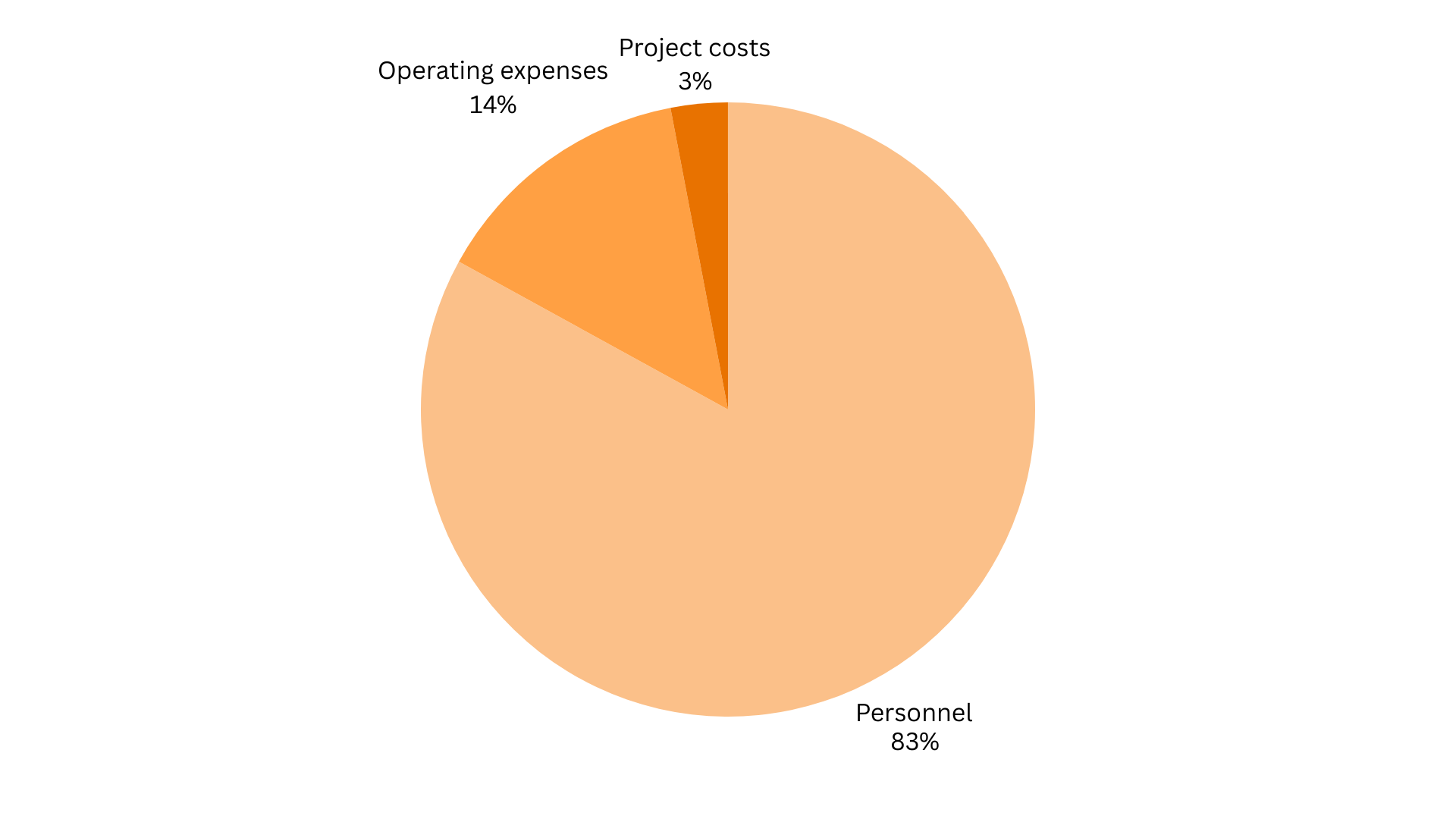OAPEN and DOAB 2024 Highlights
Contents
- Message from the Director
- OAPEN and DOAB in numbers
- Partnerships
- Technical development
- Projects
- Research and publications
- OAPEN Finances
- DOAB Finances
Message from the Director
It’s been highly stimulating to witness the continued developments in open access (OA) book publishing during 2024. As open infrastructures supporting a large community of stakeholders in this evolving landscape, OAPEN and DOAB have been very busy. Our growth, the use of our services, the project results we have helped achieve, our new partnerships, and our international engagement confirm the trend that OA book publishing is accelerating at a high pace. In these 2024 highlights you’ll find the evidence – it’s been a remarkable year!
As infrastructures, we connect the key stakeholders in scholarly book publishing, i.e., researchers, publishers, funders, and libraries. We enable a structured and seamless flow of peer-reviewed open books to help maximise the impact of the research that these books contain. Thereby, we contribute to the goal of allowing everyone to share in scientific advancement and its benefits as stated in the Article 27 of the Universal Declaration of Human Rights.
We are excited about our mission because it’s a meaningful societal contribution to democratise equitable access to knowledge. This is the deep motivational factor shaping our new strategic plans 2025-2028 for both OAPEN and DOAB that we developed last year. The strategies have been operationalised into detailed action plans that keep us on track in times of rapid change.
We continue to emphasise openness and transparency as key values in our operations. The infrastructures will always remain open. By law, we cannot be sold or acquired, and we continue our adherence to the Principles of Open Scholarly Infrastructure (POSI). To foster trust and accountability, our financial administration is thoroughly audited every year, which we believe is important for those who support or partner with us.
We are utterly grateful for the financial support and the trust that we receive from libraries and other partners worldwide. Without this support and its continued renewal, we could not operate and develop the infrastructures to meet the needs of the libraries, funders, publishers, and researchers. It’s essentially this symbiotic relationship that ensures our existence.
The technical operation of the OAPEN Library and the DOAB index is of course the core of what we do, but we would not thrive without stakeholder engagement activities and support, or without solid administrative workflows. We need highly skilled people to do all this and in 2024 we were fortunate to welcome three new colleagues: Mary Felix-Maina (General Manager), Vaggelis Theodorakopoulos (System Administrator), and Sebastiano Sali (Community Manager).
Over the past few years, OAPEN and DOAB have matured into organisations that require professional administrative systems (financial, HR, CRM, archival, and documentation). Setting up such systems is necessary to be a sustainable and reliable partner for our community of stakeholders. It involves a lot of work behind the scenes, but it’s a necessary and very useful investment in the future.
With our strategic plans in place anyone can follow our priorities for the coming years. We are excited about building on all the great achievements of 2024 together with all of you.

Niels Stern, Managing Director of OAPEN and Co-Director of DOAB
OAPEN and DOAB in numbers
OAPEN and DOAB are active in the community both online and in-person, sharing news with our communities and presenting on relevant topics at conferences around the world.
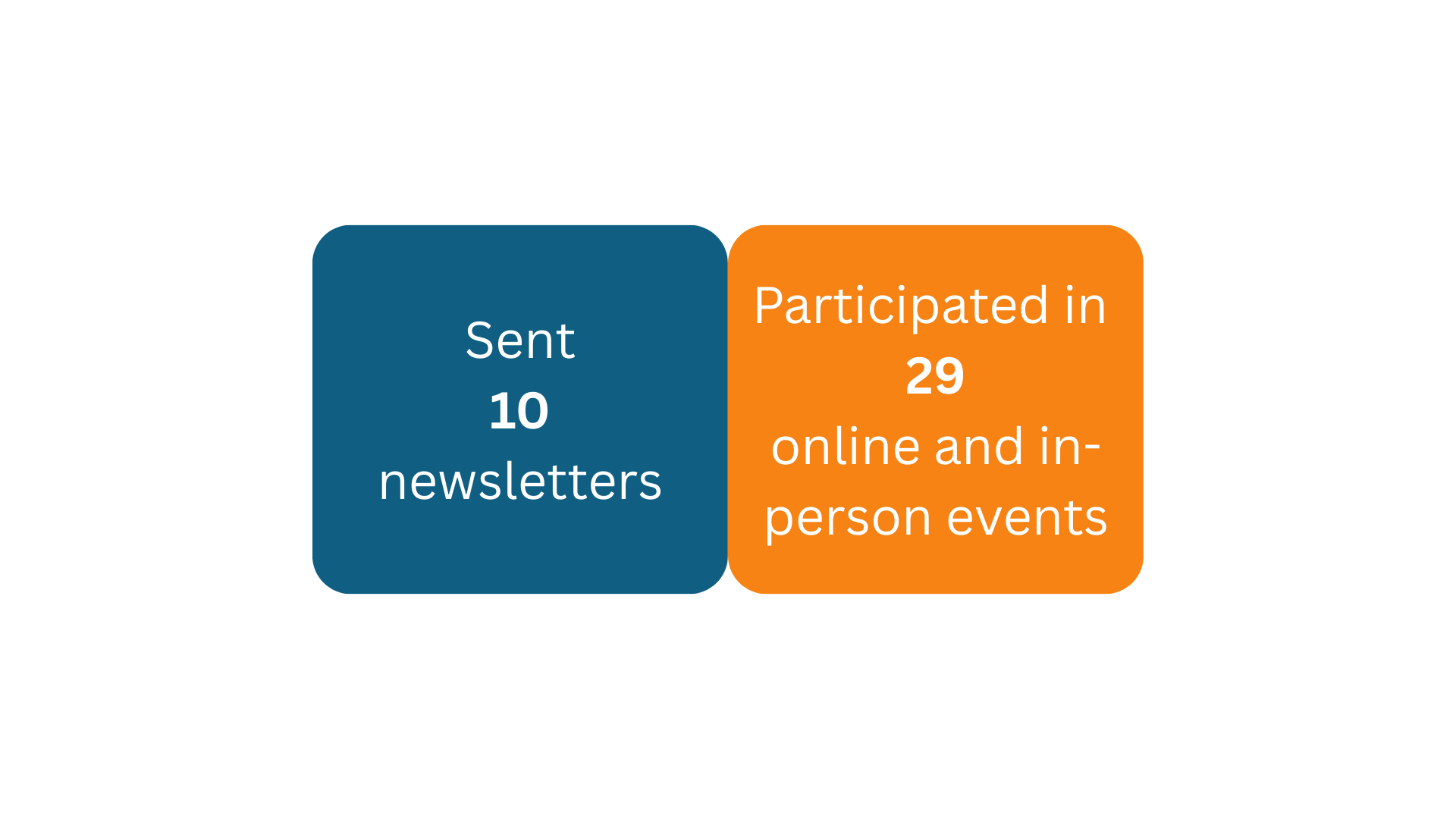
Google Analytics shows high engagement with OAPEN and DOAB throughout 2024 in the form of page views, users, and events.
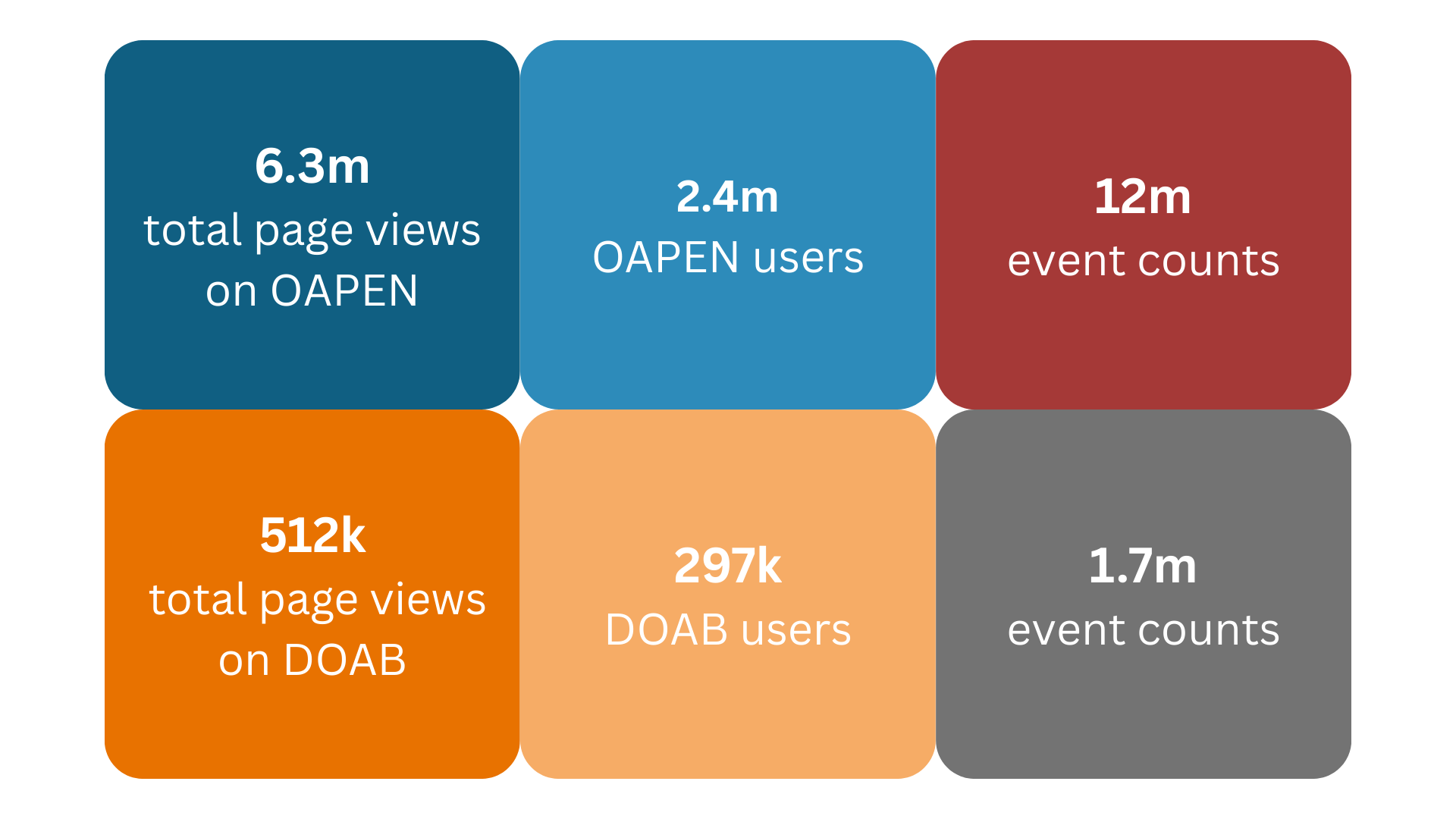
Thousands of libraries have activated the OAPEN Library and DOAB collections in their catalogues. ExLibris and OCLC are just two of the many library content aggregators offering our collections through their platforms.
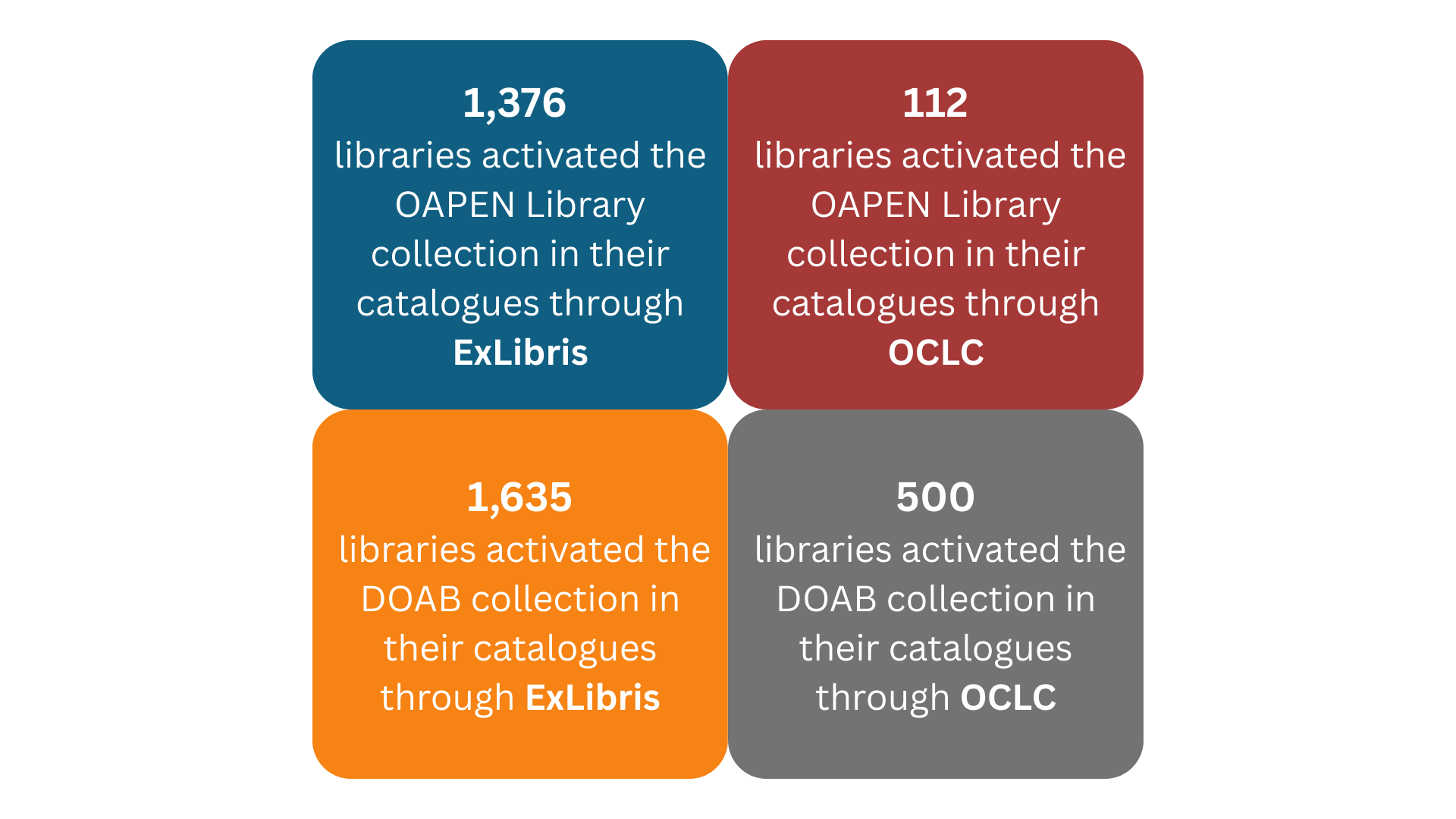
We are thankful for the valuable support we receive from libraries and consortia to uphold our operations. This support has been growing over the last five years demonstrating the importance of open infrastructures in facilitating the transition to OA for books.
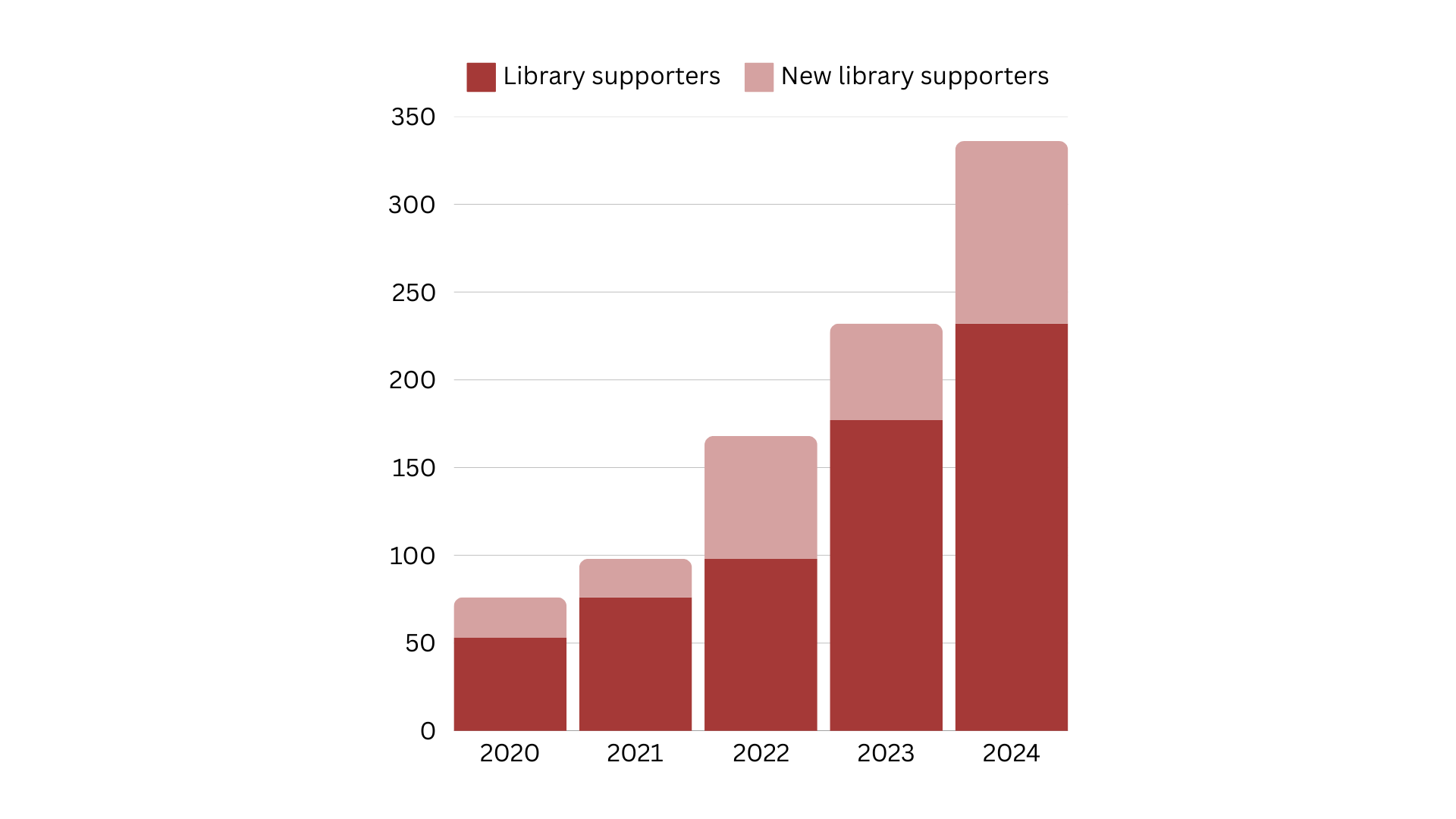
Figure 1: Cumulative bar chart showing the number of OAPEN Library and DOAB supporters over a period of five years, from 2020 to 2024.
A closer look at the OAPEN Library
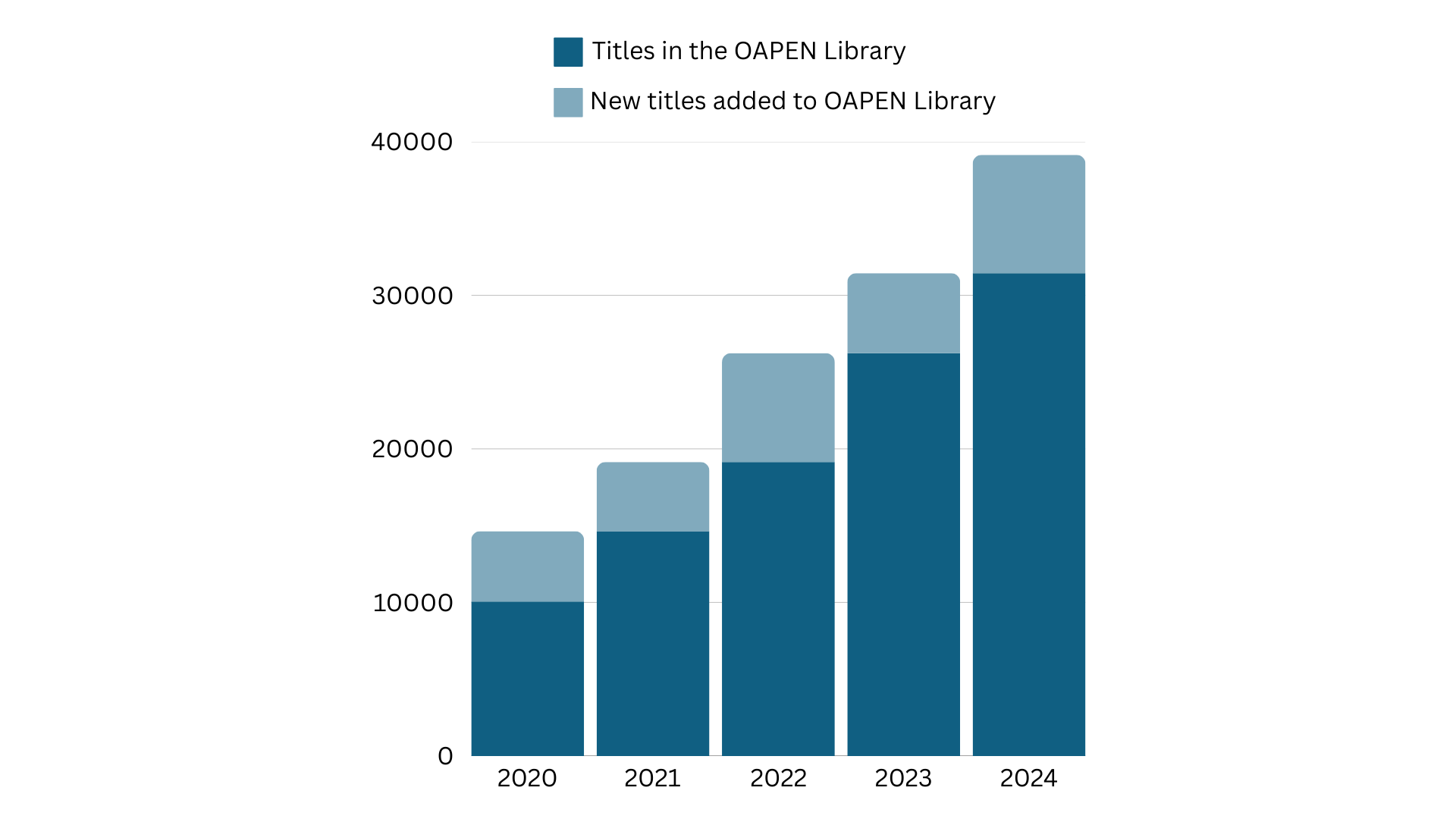
Figure 2: Cumulative bar chart showing the number of titles in the OAPEN Library and number of titles added to the OAPEN Library over a period of five years, from 2020 to 2024.
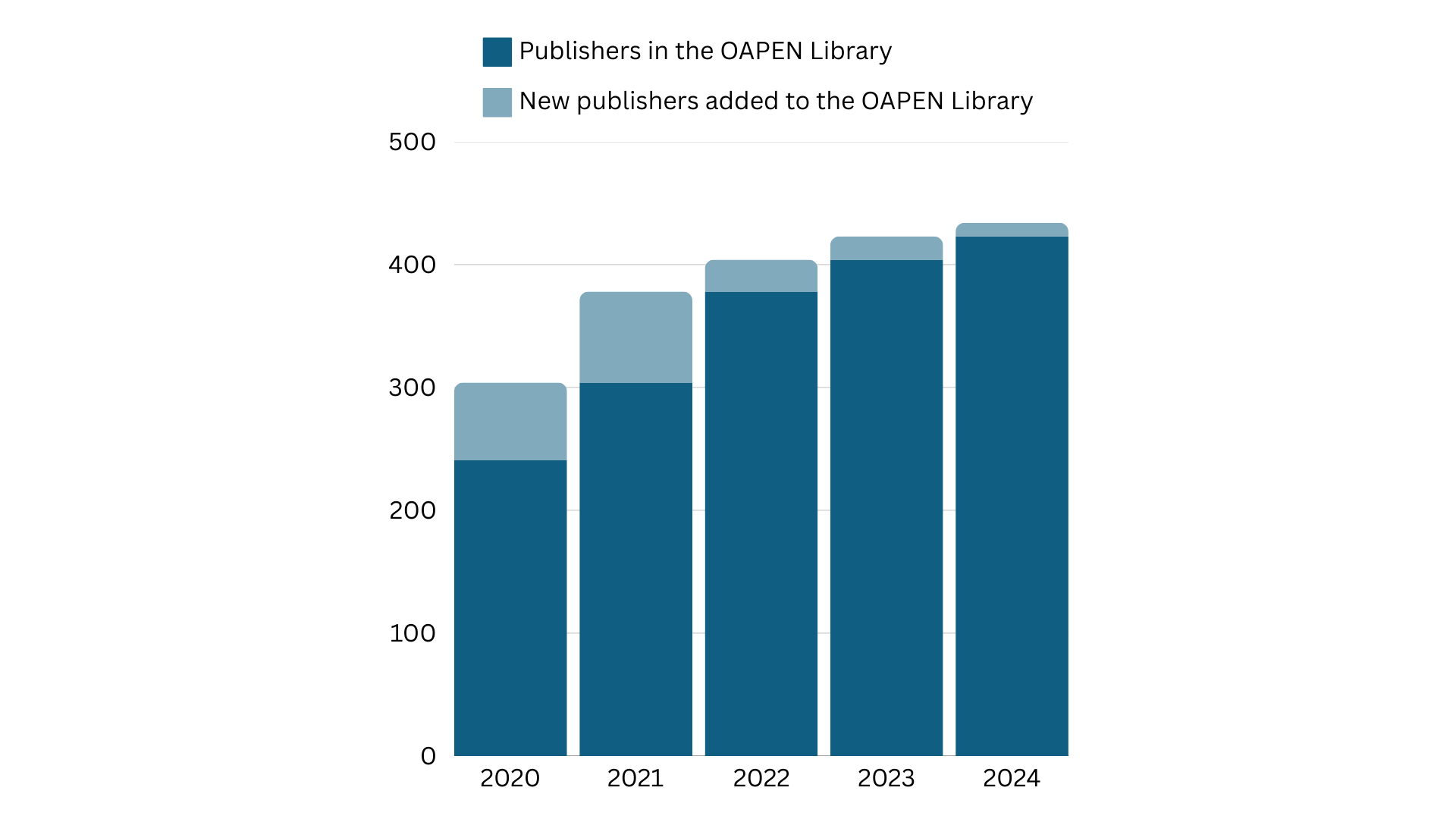
Figure 3: Cumulative bar chart showing the number of publishers in the OAPEN Library and number of publishers added to the OAPEN Library over a period of five years, from 2020 to 2024.
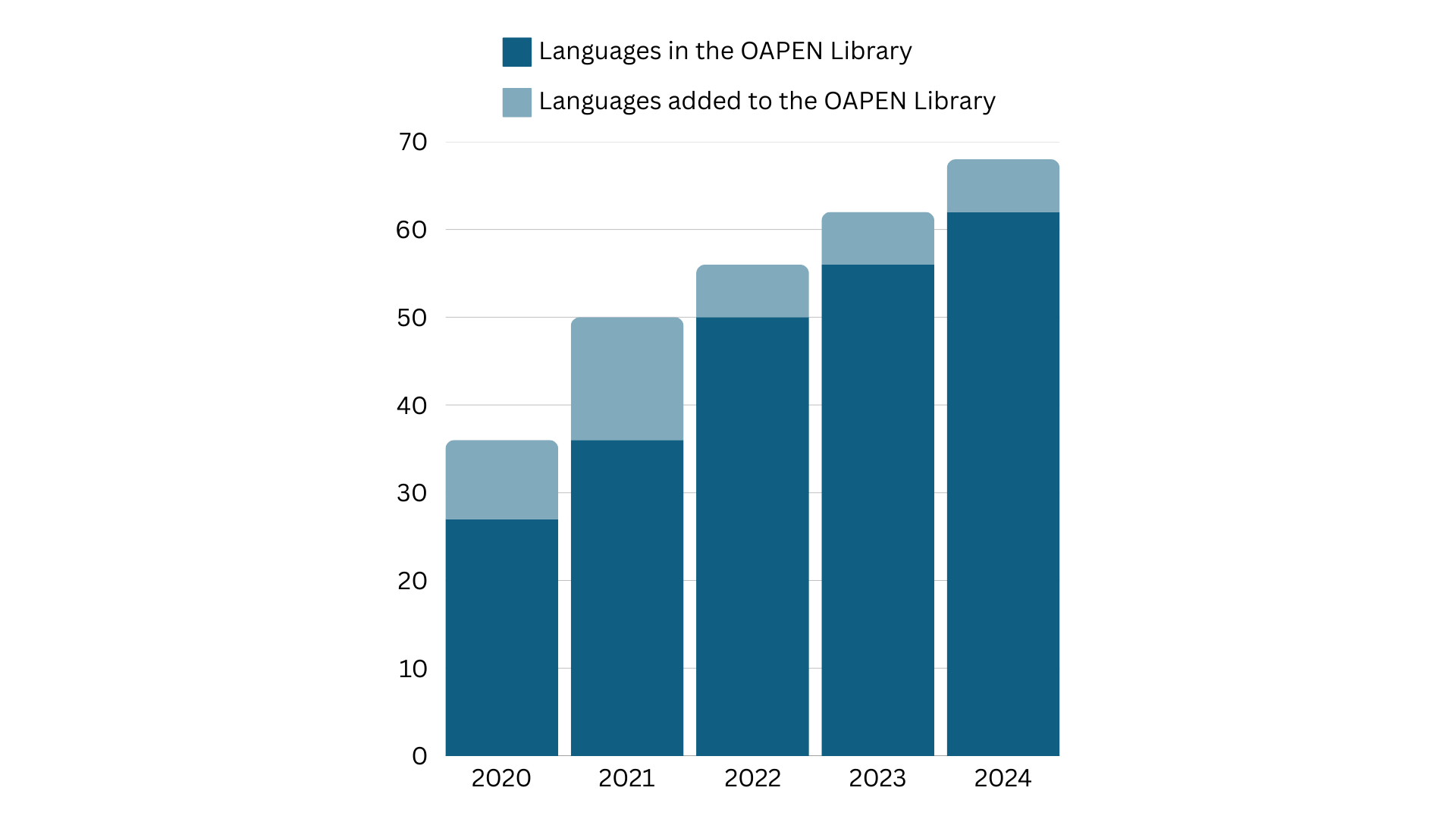
Figure 4: Cumulative bar chart showing the languages in the OAPEN Library and languages added to the OAPEN Library over a period of five years, from 2020 to 2024.
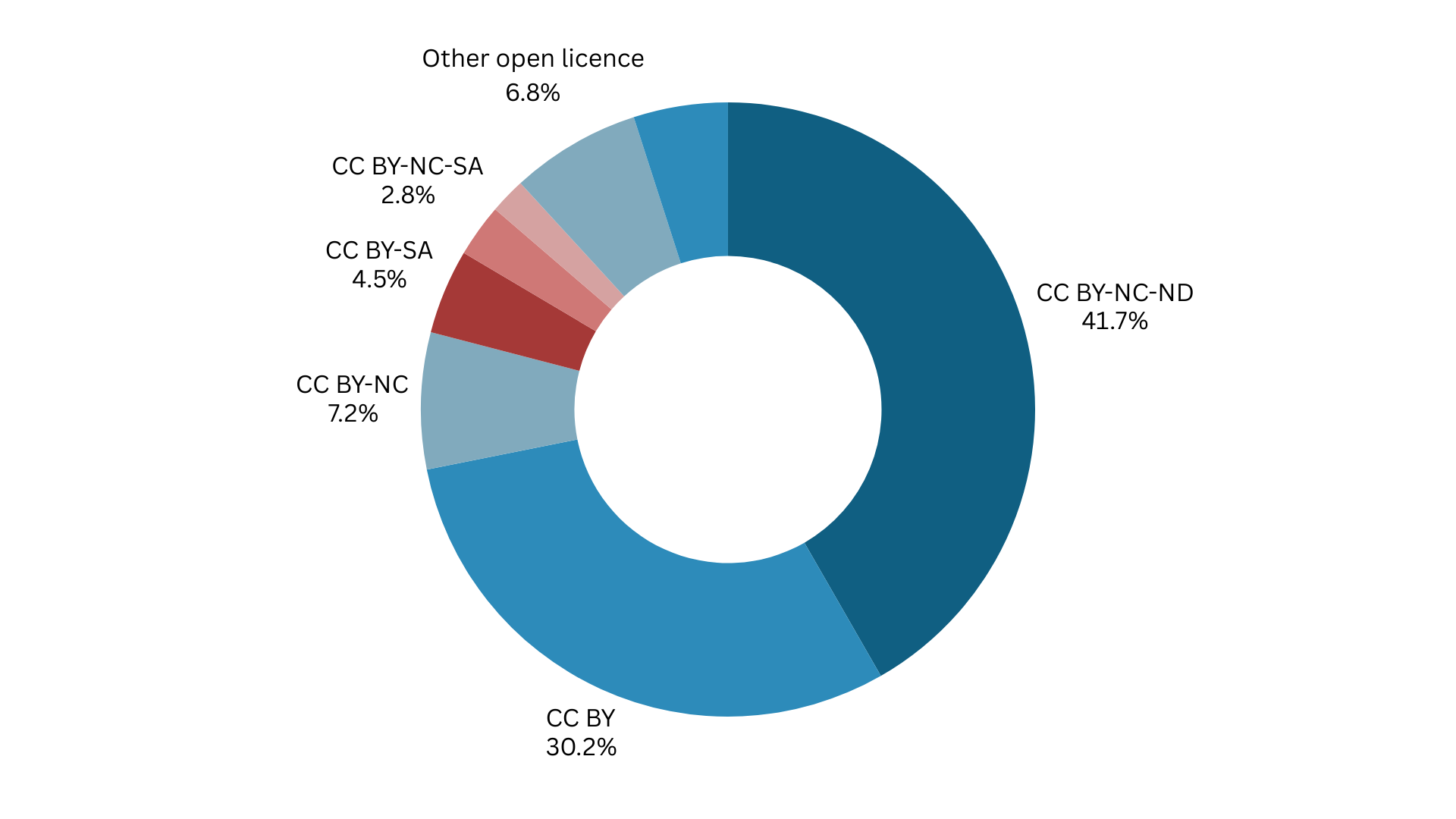
Figure 5: Doughnut chart showing the licences represented in the OAPEN Library as of the end of 2024.
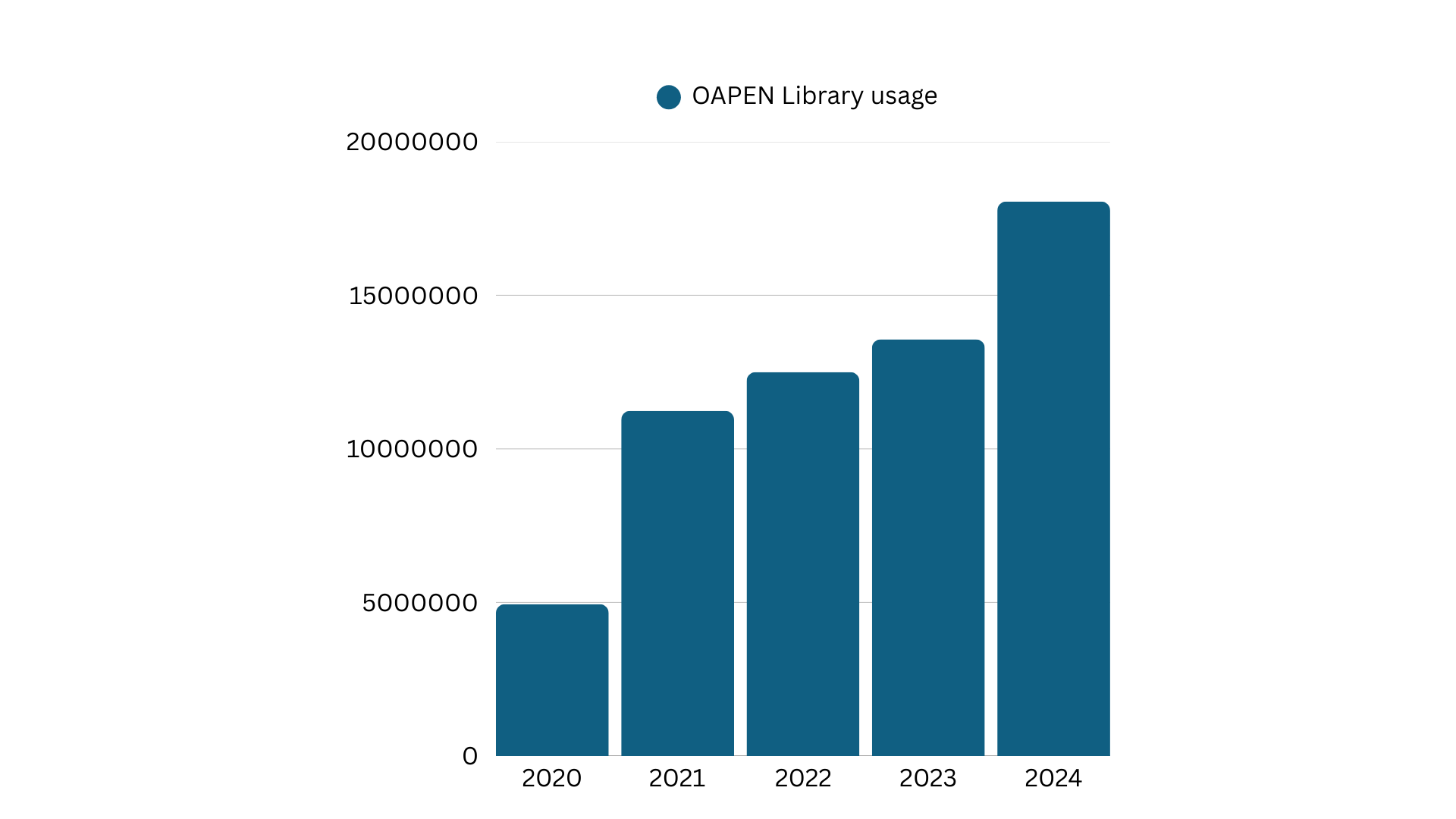
Figure 6: Bar chart showing COUNTER usage in the OAPEN Library over a period of five years, from 2020 to 2024.
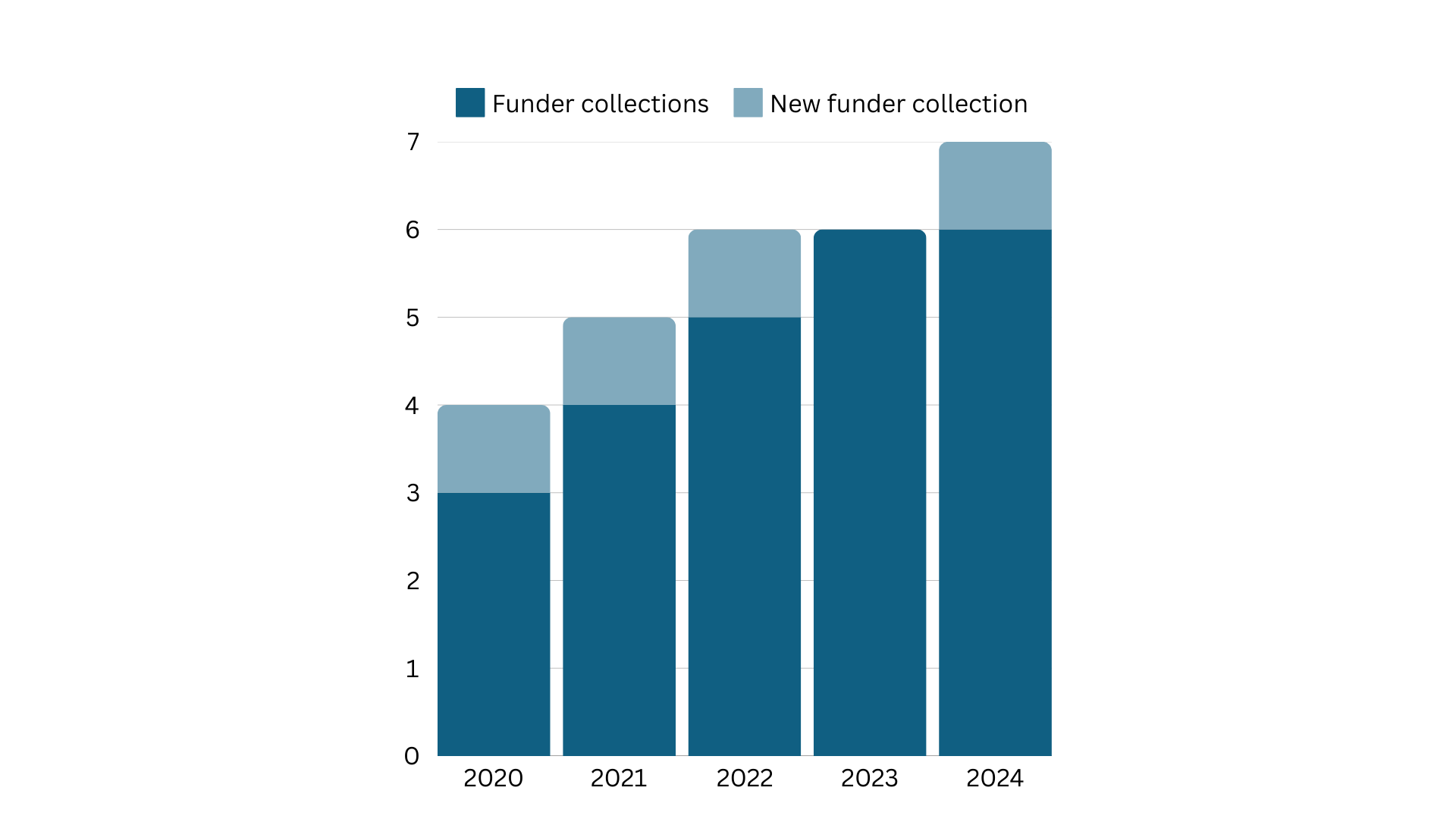
Figure 7: Cumulative bar chart showing the number of funder collections in the OAPEN Library and new funder collections added to the OAPEN Library over a period of five years, from 2020 to 2024.
A closer look at DOAB
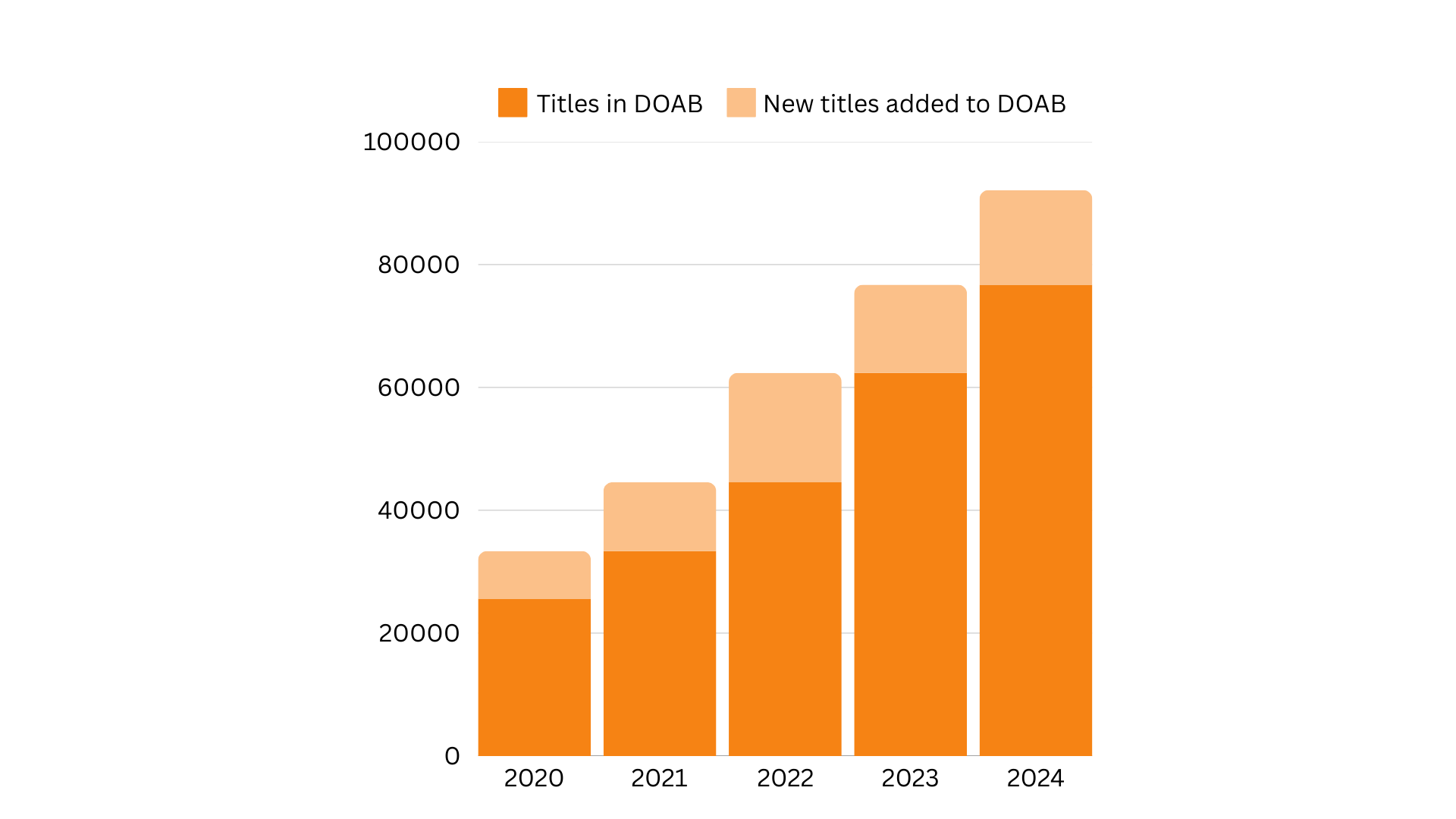
Figure 8: Cumulative bar chart showing the number of titles in DOAB and number of titles added to DOAB over a period of five years, from 2020 to 2024.
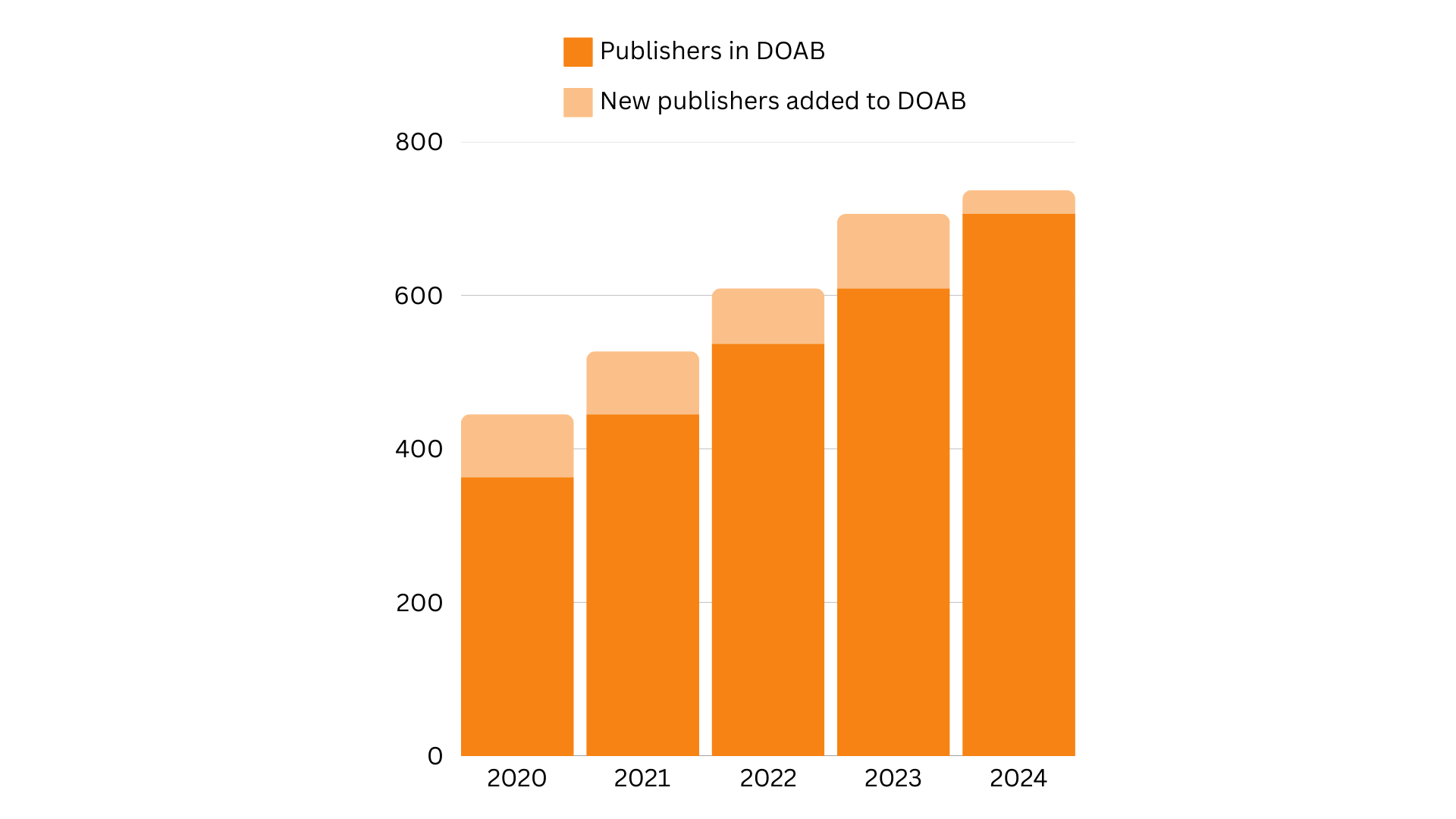
Figure 9: Cumulative bar chart showing the number of publishers in DOAB and number of publishers added to DOAB over a period of five years, from 2020 to 2024.
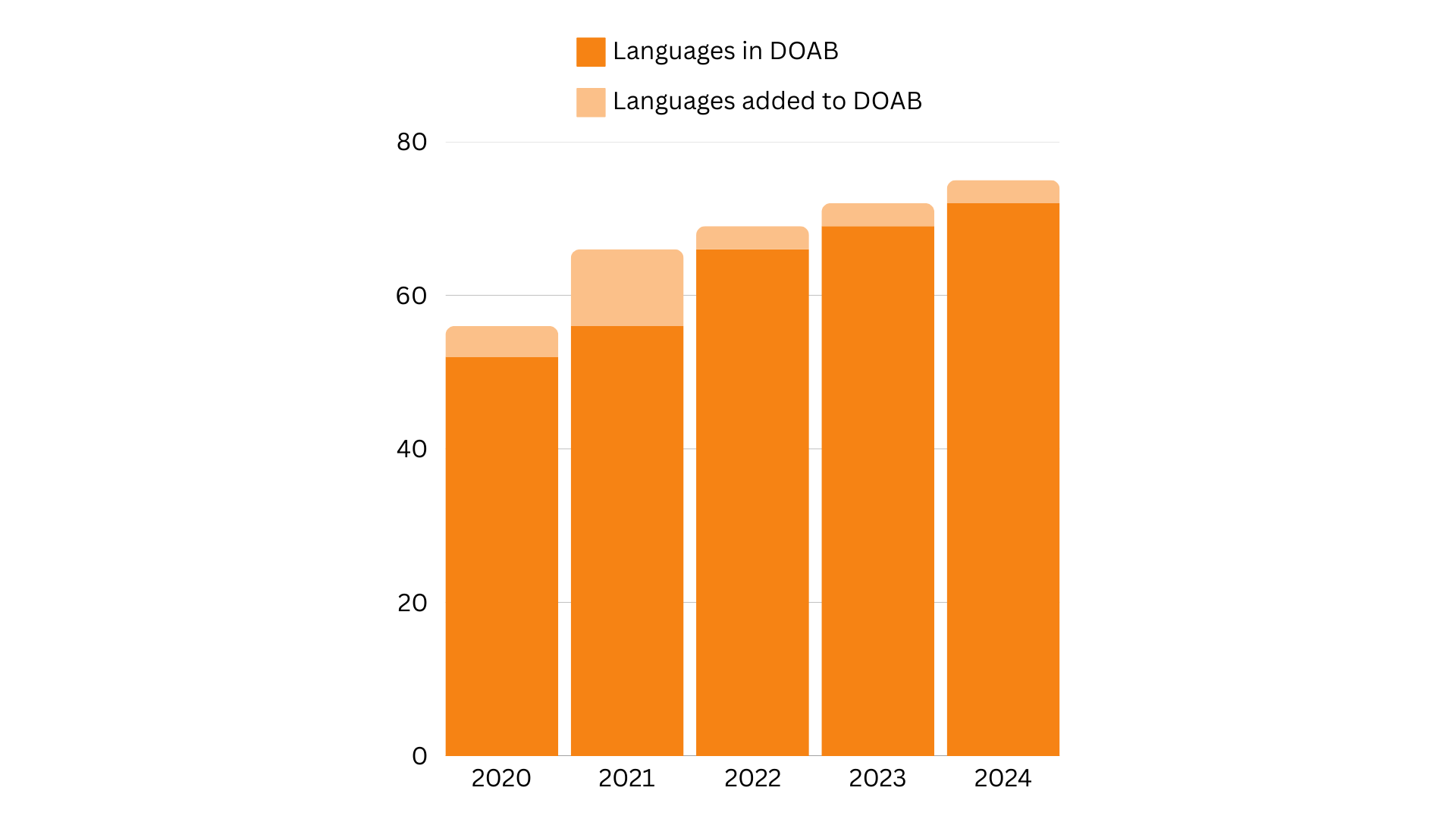
Figure 10: Cumulative bar chart showing the languages in DOAB and languages added to DOAB over a period of five years, from 2020 to 2024.
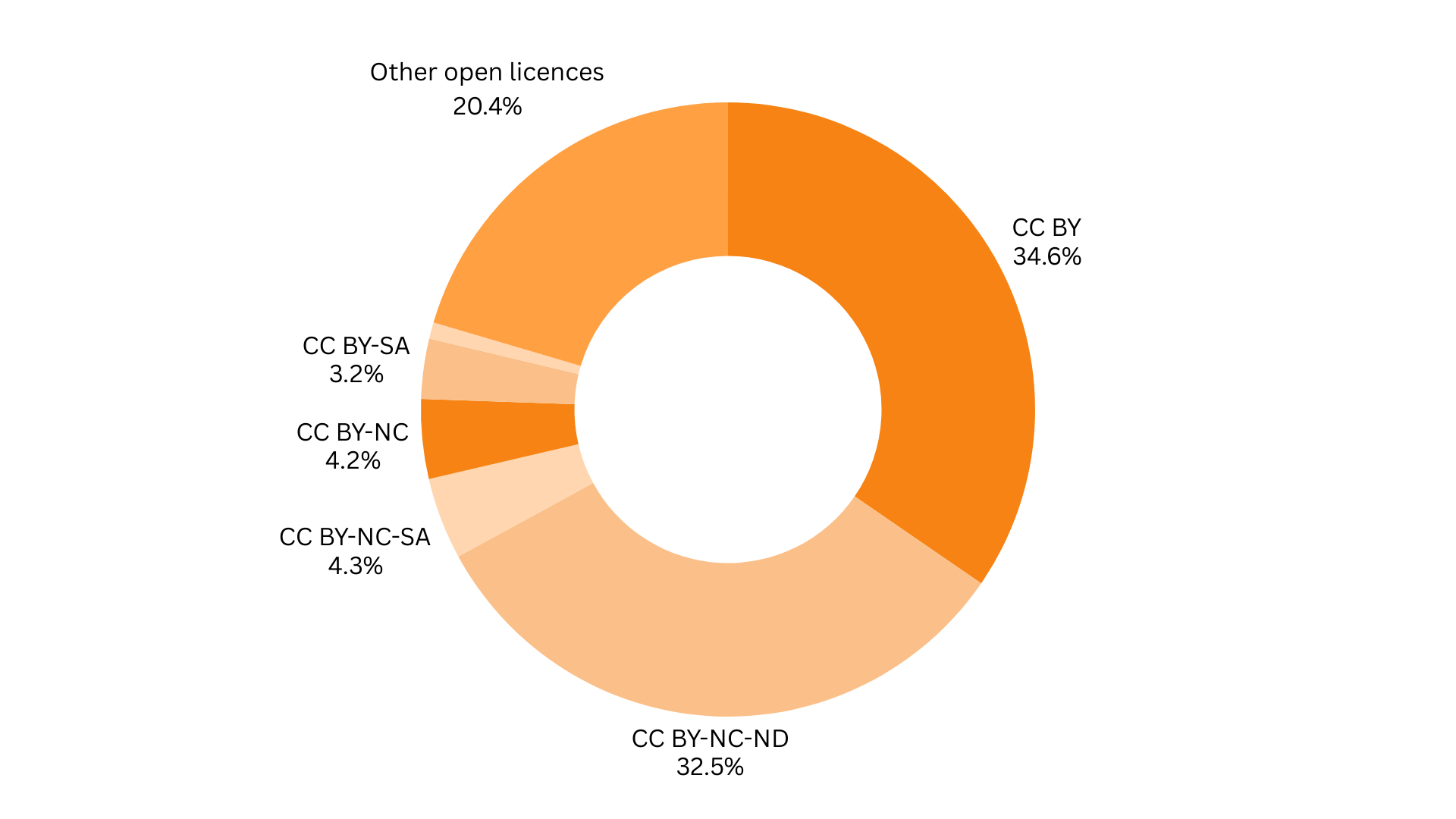
Figure 11: Doughnut chart showing the licences represented in DOAB as of the end of 2024.
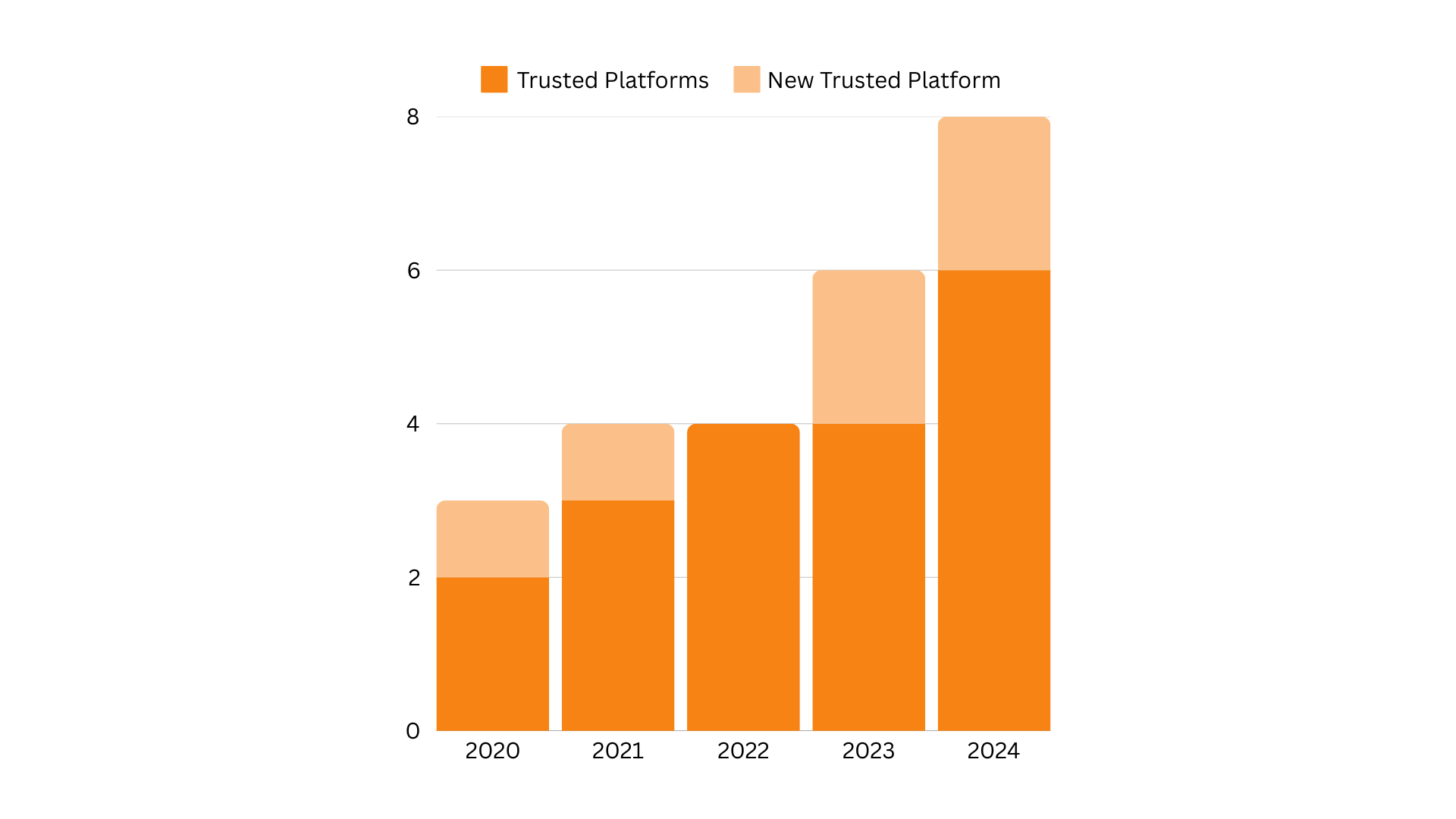
Figure 12: Cumulative bar chart showing the number of Trusted Platforms in DOAB and new Trusted Platforms added to DOAB over a period of five years, from 2020 to 2024.
Partnerships
CERN: Strengthening open access to books
In March, together with CERN, we announced our plans to migrate the OAPEN Library and DOAB servers to CERN’s Data Center, which was completed by the end of the year. This partnership is built on an existing collaboration in which OAPEN hosts and disseminates books from the SCOAP3 for Books programme at CERN. Through a common goal to promote openness, this agreement with CERN is an important milestone in OAPEN’s and DOAB’s history and cements them as vital OA book infrastructures for the global research community. It greatly increases our operational efficiency and reliability, enhancing stability for our stakeholders worldwide.
CERN, the European Organization for Nuclear Research, is one of the world’s largest scientific research organisations. CERN is committed to the advancement of science and the wide dissemination of knowledge by embracing and promoting practices making scientific research more open, collaborative, and responsive to societal changes.
CERN is delighted to enhance our existing partnership with the OAPEN Library to provide a stable, robust, and efficient experience for readers all around the world. We are thrilled to support this key piece of scholarly infrastructure to support the needs of researchers, students, teachers, and curious readers worldwide and across disciplines! – Kamran Naim, Head of Open Science at CERN.
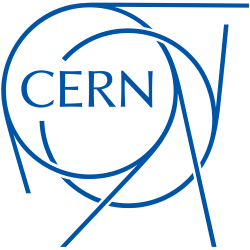
The CERN logo. Credit: CERN
UKRI: Supporting open access policies
In December, we formed a new partnership with UK Research and Innovation (UKRI) to provide a dedicated set of services for OA books funded by them. As of 1 January 2024, UKRI extended its OA policy to include all in-scope monographs, book chapters, and edited collections published from that date. They also launched a new fund to support OA costs for long-form publications covered by this policy. Under the terms of our partnership, all UKRI funded OA books will be made available in the OAPEN Library as part of a funded collection through the OAPEN Funder Services starting in February 2025.
At UKRI we introduced our new open access books policy in 2024, and via this new collaboration with OAPEN we can be more confident about the discovery, access, and use of the research results from UKRI funded research. We look forward to working together, and with other OAPEN partners, to support open and transparent research. – Rachel Bruce, Head of Open Research at UKRI.

The UKRI logo. Credit: UKRI
OPERAS’ new Special Interest Group on OA books
OAPEN will coordinate the new OPERAS Special Interest Group (SIG) on OA books. The new SIG’s main objective is to coordinate meetings and strategic discussions between its three working groups (WG): Open Access Books Network (OABN), Business Models, and Open Infrastructures. The WGs will also contribute to shaping the agenda for the Policy Forum for OA Books meetings, hosted by Science Europe in coordination with cOAlition-S and OAPEN, succeeding the Funder Forum that was part of the PALOMERA project.
We are immensely grateful to OAPEN for their leadership in forming the Open Access Book SIG. This initiative is essential for OPERAS’ commitment to meeting the scholarly communication needs of SSH researchers, where books are paramount. We are enthusiastic about the collective work of the SIG to promote and develop open access books throughout the European Research Area. – Pierre Mounier, Co-coordinator of OPERAS
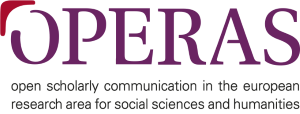
The OPERAS logo. Credit: OPERAS
Thoth: Facilitating OA book discovery
OAPEN and Thoth Open Metadata entered into an agreement which saw Thoth become an OAPEN intermediary, facilitating easy management for the direct submission of OA books and corresponding metadata to the OAPEN Library. This particularly benefits small and scholar-led publishers that use Thoth and also enables their publications to be discoverable in DOAB.
Thoth is a community-led non-profit platform and service facilitating open metadata management and dissemination workflows for OA books and book chapters.
Thoth is delighted to be able to work with the OAPEN foundation to improve the creation, discovery and dissemination of OA book metadata and content. This collaboration not only helps smaller publishers to more effectively disseminate their content, but also shows how improving interoperability between non-profit, open and mission aligned infrastructures can create systemic benefits that exceed the sum of their individual parts. We look forward to extending and deepening our partnership in the coming years. – Rupert Gatti, Director of Open Book Publishers

The Thoth Open Metadata logo. Credit: Thoth Open Metadata
IOI: Investing in open infrastructures
OAPEN and DOAB were two of the first infrastructures to participate in Invest in Open Infrastructure’s new tool, Infra Finder. Infra Finder is a resource for anyone navigating the complex landscape of infrastructure services and standards enabling open research and scholarship. Participating in this tool provides us with the opportunity to disseminate a lot of information in a very concise way and be more transparent about what we do. This is useful because we can share our entries with institutions, funders, and anyone who wants to work with us or is interested in learning more about our work.
We were delighted to have OAPEN create two of our first entries in Infra Finder for DOAB and the OAPEN Library. They provided indispensable feedback for our programs, which helped us develop Infra Finder to better connect institutions to open infrastructure choices that align with their values. – Kaitlin Thaney, Executive Director, Invest in Open Infrastructure.

The Invest in Open Infrastructure logo. Credit: Invest in Open Infrastructure
Technical development
Converting from BIC to Thema
For over a decade, we have been using the BIC classification code, which was used by many – mostly UK based – publishers. However, the BIC classification was deprecated in February 2024 and is succeeded by the Thema classification. Thema aims to be a globally applicable classification. It’s a flexible standard that allows several groups to retain their unique cultural voice while still presenting a unified subject hierarchy that rationalises book classification.
Replacing BIC by Thema called for a thorough approach. It required careful planning and execution as 33,000 titles in the OAPEN Library and 80,000 titles in DOAB needed to be updated. Most titles have more than one classification code, which means that, after the conversion, over 71,900 Thema codes have been added to the OAPEN Library and 123,200 Thema codes to DOAB. Each record in our database had to be updated, which means removing the BIC code and replacing it with the correct Thema code – or codes. For instance, the BIC classification “ACV” (History of art & design styles: c 1800 to c 1900) is replaced by the Thema code “AGA” (History of art) in combination with “3NM” (19th century, c 1800 to c 1899).
MEMO: Bespoke metadata exports for the OAPEN Library
In 2024 we introduced MEMO (Metadata Export Module for Open access books), a flexible module designed to create bespoke metadata exports from the OAPEN Library for libraries. It was developed because of an increasing demand for selections of titles based on different criteria and in different metadata formats. MEMO allows exports to be defined by subject, language, publication type, and update frequency, and to be exported in multiple formats (JSON, MARCXML, KBART, HTML, RSS, and ONIX). These exports can then be made public or password protected.
We have also been deploying MEMO for exporting metadata to the Clarivate Gobi procurement tool. It requires very specific XML book metadata, which OAPEN provides monthly. This allows libraries to check whether a book is OA before purchasing a closed access ebook. Another application is based on a partnership between OAPEN and Lyrasis to integrate the OAPEN Library collection with The Palace Project. The goal of The Palace Project is to support public libraries in their mission to provide equitable access to digital content. Through this joint effort, more than 22,000 OA books have been made available for libraries.
Direct integration with DOAB and OAPEN: OMP and Thoth
Starting in 2023, OAPEN and the Public Knowledge Project (PKP) are working on a project to allow users of PKP’s Open Monograph Press (OMP) tool to directly export book metadata to DOAB. This will be achieved by creating ONIX XML metadata files that are consistent with the standards used by DOAB. Much preparation was done throughout 2024 to make sure that OMP creates an ONIX file that fits the requirements of DOAB to allow for deployment in 2025.
Additionally, OAPEN and Thoth started exploring ways to automatically send and integrate metadata and books into OAPEN. Here, the so-called SWORD protocol will be deployed during 2025.
Projects
PALOMERA
For two years, OAPEN has been engaged in the PALOMERA (Policy Alignment of Open Monographs in the European Research Area) project as its Scientific Coordinator and in other roles. The project, which ended 31 December 2024, has delivered a comprehensive overview of OA book policies based on research across 39 European Research Area (ERA) countries, collecting and analysing vast amounts of knowledge and generating actionable recommendations to enhance OA in scholarly book publishing. During its lifetime, the project engaged 16 partners and numerous stakeholders through 42 interviews, 420 survey responses, 3 validations exercises, and many communication activities.
Collecting over 650 policy and policy-related documents in an open Knowledge Base, PALOMERA has established the most complete overview to date of OA policies related to academic books in the ERA. Based on this knowledge, the project performed extensive research that revealed significant gaps in existing policies – many of which either overlook or ambiguously address scholarly books – and has highlighted the need for clearer and better aligned funder and institutional strategies and policies.
Building on these findings, PALOMERA has formulated 43 recommendations tailored to different stakeholder groups, ranging from general advice (e.g., using clear language in policies, raising awareness) to specific guidance on monitoring, funding mechanisms, and reward systems for OA books.
OAPEN has been involved in all parts of the project and will continue its engagement to support the legacy of the project. For example, OAPEN is technically maintaining the PALOMERA Knowledge Base and providing workflow descriptions for its continuation; OAPEN has also enhanced its OA Books Toolkit by integrating a new section on funder and policy insights derived from the PALOMERA research. Looking ahead, the establishment of a new Policy Forum for OA Books, hosted by Science Europe in coordination with cOAlition S and OAPEN and supported by SPARC Europe, OPERAS, and other organisations, aims to further implement PALOMERA’s recommendations by expanding and structuring the OA book policy conversations between funders and policymakers and the wider OA books community – to a large extent represented in Europe by the members of the OPERAS OA Books Special Interest Group. Moreover, the Policy Forum could also foster international dialogue and collaboration, ensuring that the momentum generated by PALOMERA continues to drive progress towards a more transparent, equitable, and effective OA book publishing landscape across Europe and beyond.
Overall, PALOMERA has raised the level of knowledge and evidence on OA book policies and produced tangible pathways for continued development in this domain and prepared OAPEN and other partners to leverage related topics in future projects, for example in the fast-growing area of diamond OA.

The PALOMERA logo. Credit: PALOMERA
COPIM/OBF, DOAB in Africa, ALMASI – a confluence of collaborations in OA book publishing
Throughout 2024, DOAB continued its fruitful engagement within Open Book Futures (OBF), a project funded by Research England and the Arcadia Fund that aims to promote community-led and bibliodiverse initiatives within OA book publishing. The project’s various initiatives – including the Open Book Collective (OBC), Thoth Open Metadata, and the Opening the Future revenue model – are developing vital tools, resources, and models that are helping small and medium-sized OA publishers that are either fully OA or looking to transition. The project is also doing important work in the areas of accessibility, experimental publishing, and archiving.
OAPEN, DOAB, and OBF are all committed to engaging in OA books publishing beyond the Global North and have participated in many collaborative workshops and events together, also within the DOAB in Africa project. One of the first collaborations DOAB co-organised and co-hosted was a three-day workshop in February 2024 at the University of Cape Town, South Africa, themed “Towards Sustainable Open Access Book Publishing in the African Context.” A key takeaway from this event was the need for greater collaboration across the OA book ecosystem in Africa rather than working in silos.
Building on this, in October 2024, DOAB, OAPEN, OASPA, and CNRS hosted an online forum, “Sustainable Open Access Book Publishing in East Africa,” bringing together publishers from Kenya, Ethiopia, Uganda, and Tanzania. Discussions covered OA initiatives, impact assessments, revenue models, and broader challenges in the region.
Ahead of the 2nd Global Diamond Open Access Summit in December 2024, DOAB and OAPEN jointly organised a two-day pre-summit workshop on open monographs at the University of Cape Town, attended by fifty participants from across Africa. One key activity included using findings from the PALOMERA project to offer insights into European OA book policies as a reflection point for African OA practitioners. Another key activity consisted of a networking and stakeholder mapping exercise with an aim to engage African collaborators as regional experts in their contributions to the mapping exercise and eventually exploiting the results of the stakeholder map.
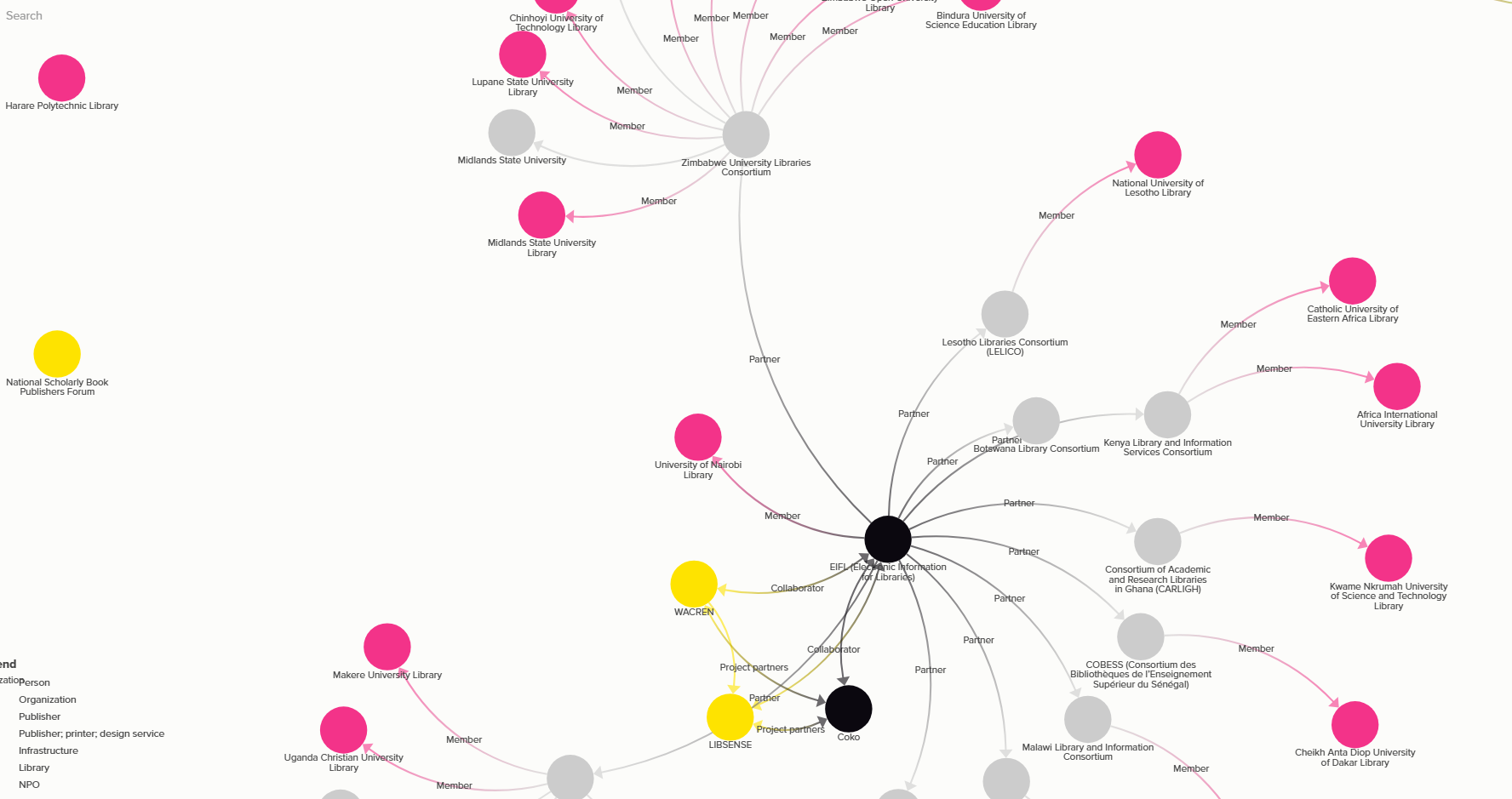
Image 1: A snippet of a network diagram showing connections between libraries, publishers, and other organisations with the African scholarly communications landscape. Credit: Kumu.io
Many exciting activities are continuing in 2025, following on from these successful collaborative events, including:
- The establishing of an OA Stakeholders in African Context Working Group with a focus on sustainable OA book publishing. The group will hold its first workshop in March 2025.
- Participating in the Aligning and Mutualizing Nonprofit Open Access Publishing Services Internationally (ALMASI) project, spanning Africa, Europe, and Latin America.
This growing momentum for OA book publishing in Africa is the result of intentional and collaborative efforts by multiple partners, including the COPIM team, UCT Libraries, OASPA, CNRS, and, increasingly, African stakeholders. OAPEN and DOAB are thrilled to be a part of such efforts.
Research and publications
Snijder, R., & Kingsley, D. (2024). Research Assessment Systems and the Effects of Publication Language: Manifestations in the Directory of Open Access Books. The Journal of Electronic Publishing, 27(1). DOI: https://doi.org/10.3998/jep.4847.
Research assessment is a major driver of research behaviour. The need to publish in English even when it’s not the local language affects the type of research undertaken and further consolidates the Global North-centric view or scientific approach. The bibliometric databases used for scholarly assessments are owned by two corporate organisations. Open infrastructures, such as OAPEN or DOAB, offer an alternative. It’s encouraging that DOAB, which could be seen as the focal point for OA peer-reviewed books, is already listing a relatively large number of titles in languages other than English, as explored in this article.
Snijder, R. (2024). Open Access Books Collections as a Swiss Army Knife. In The Charleston Conference Proceedings 2023. Against the Grain Media. https://www.fulcrum.org/epubs/d217qs76b?locale=en#/6/22[chapter-003]!/4/2/2[charleston-conference-innovative-lightning-round-4-open-access-books-collections-as-a-swiss-army-knife]/2/4/1:0
This article explores creative solutions for a developing OAPEN service for recommending books, the recommender service, which isn’t rooted in privacy infringements but uses text-mining techniques. Combined with MEMO, could this be a new service for libraries, enabling them to find the most downloaded books?
Stern, N. (2024). Research Funders and the Transition to Open Access Books. In Against the Grain, V36#1. https://issuu.com/against-the-grain/docs/feb_2024_v36-1/s/45026119
Why is the transition to OA for academic books happening at a much slower rate than for journal articles? We know that OA policies are key drivers to change, so how can we help those making OA policies include books as well? This article seeks to answer such questions.
Stern, N. et al. (2024). PALOMERA 2nd Policy Brief. Zenodo. https://doi.org/10.5281/zenodo.14557420
This policy brief provides an overview of the analysis performed in the EU-funded PALOMERA project. General and stakeholder specific recommendations have been formulated in actionable ways. Furthermore, it describes other key results like the Knowledge Base, an extended OAPEN OA Books Toolkit, and the establishment of a Funder Forum that key stakeholders like Science Europe, cOAlition S, and OAPEN will continue to jointly coordinate as a Policy Forum for Open Access Books.
Deville, Joe; Findanis, Jordy; Stern, Niels (2024). How Should We Evaluate Open Access Book Publishing? Katina Magazine. https://katinamagazine.org/content/article/open-knowledge/2024/how-should-we-evaluate-open-access-book-publishing
A wide group of stakeholders in the OA book publishing ecosystem, including funders, university libraries, and OA service providers, have been considering the criteria for evaluating OA publishers and their books. This article explores scepticism around the quality and sustainability of OA books and shows how stakeholders are developing a range of criteria to help set standards and respond to appropriate concerns.
OAPEN Finances
All the valuable support we receive from libraries and consortia needs to be sustained through continued support – otherwise we will not be able to uphold our operations. We have therefore been very pleased to see that almost all those libraries decided to continue their support of OAPEN and DOAB in 2024. We thank all our supporting libraries for their contributions in 2024. We know that library budgets are often tight, that resources are prioritised carefully, and commitments often only made for one year. Although one-year contributions make long-term technical investments less easy, we are grateful that over 300 institutions believe that investing in open infrastructures for books is important and that OAPEN and DOAB are deemed trustworthy recipients of their support.
OAPEN closed the 2024 financial year with a positive result of € 68,888. From this result, an amount of € 60,000 is added to a contingency fund and € 8,888 is added to the general reserves. This makes the size of our financial reserves € 320,000. For the public institutions supporting OAPEN, it’s important that OAPEN is an open and transparent organisation following generally accepted principles on governance, sustainability, and insurance. As stated above, OAPEN adheres to these principles, which are formulated in the Principles of Open Scholarly Infrastructure and recommended to open infrastructures. Two principles relate well to the financial statement:
-
Goal to generate surplus – organisations which define sustainability based merely on recovering costs are brittle and stagnant. It’s not enough to merely survive; it has to be able to adapt and change. To weather economic, social, and technological volatility, they need financial resources beyond immediate operating costs.
-
Goal to create contingency fund to support operations for twelve months – a high priority should be generating a contingency fund that can support a complete, orderly wind down (twelve months in most cases). This fund should be separate from those allocated to covering operating risk and investment in development.
OAPEN follows these principles by seeking a balanced surplus and by setting aside revenue each year to build its contingency fund. The exact size of the contingency fund is established by the OAPEN Supervisory Board on a yearly basis. The contingency fund should cover at least twelve months of operational costs for OAPEN.
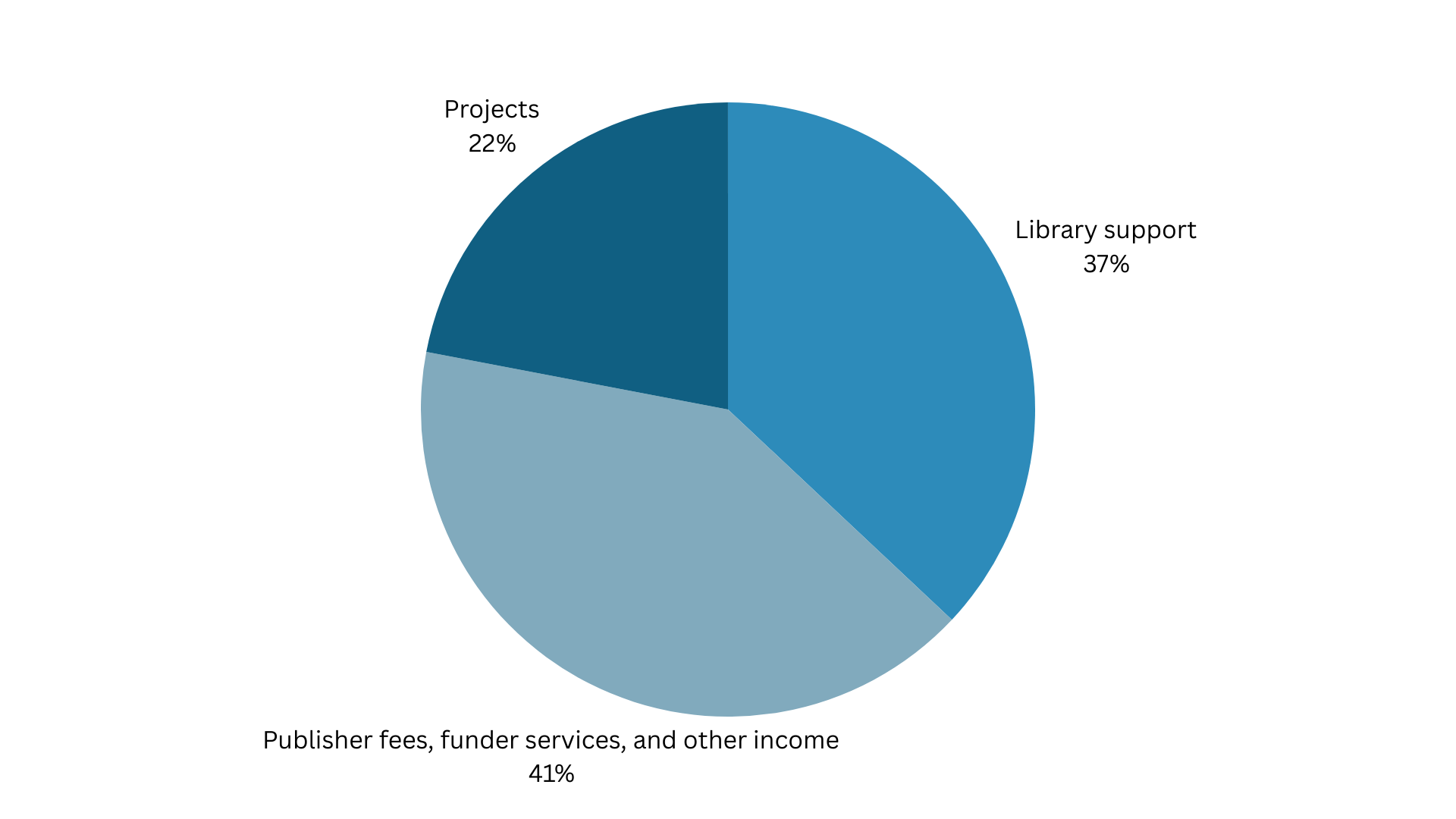
Figure 13: A pie chart showing the income for OAPEN in 2024
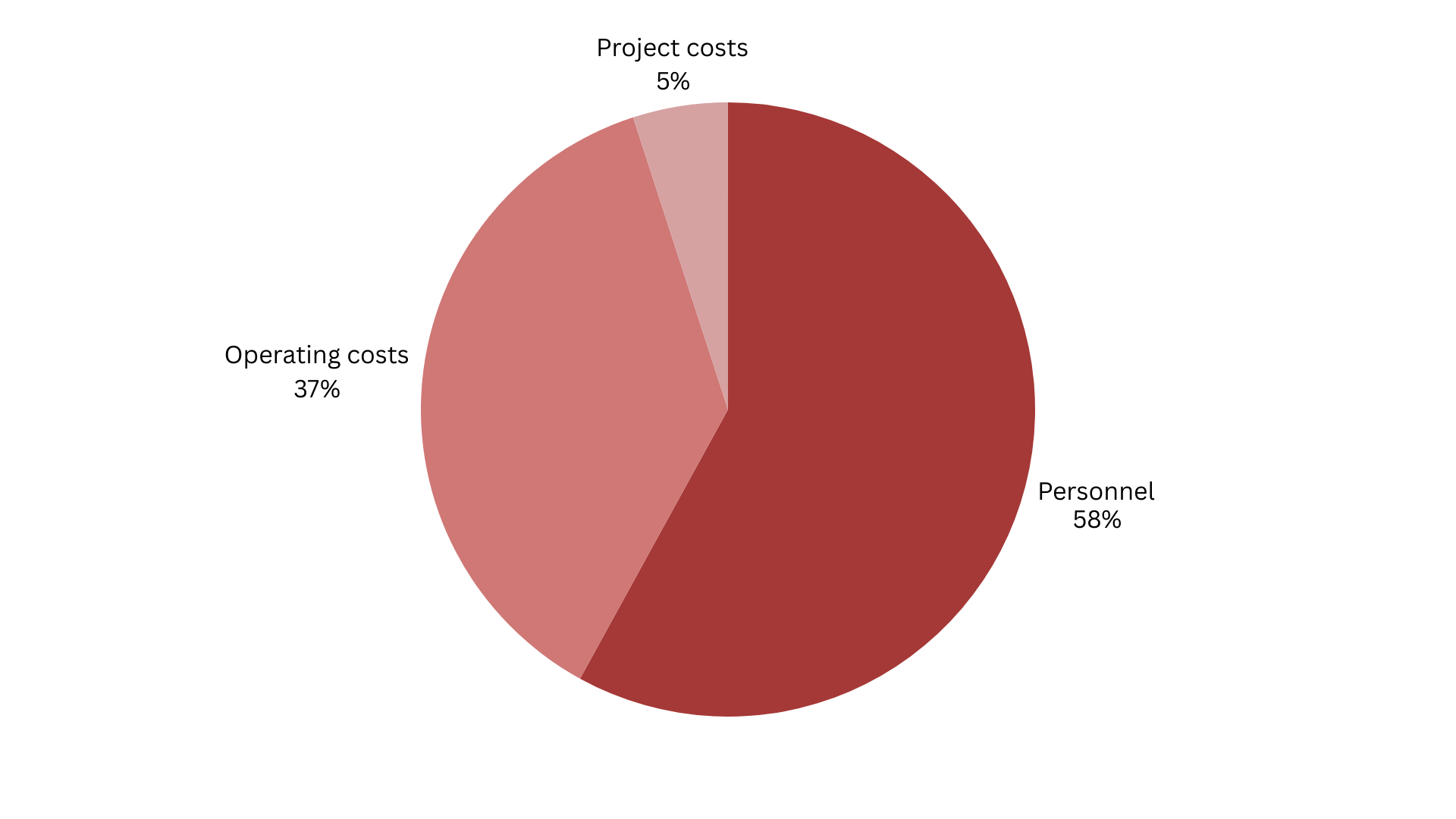
Figure 14: A pie chart showing the costs for OAPEN in 2024
DOAB Finances
In 2024 the DOAB Foundation closed the financial year with an operating result of € -44,501, however still with a positive balance of € 41,249 and a positive liquidity. As there is no surplus, the contingency fund will remain at the same level as in 2023, namely at € 95,000.
There are several reasons for the negative result including higher IT costs than planned, higher personnel costs due onboarding of new staff members in 2024, and increased HR admin costs for the management of staff in several countries.
The maintenance costs of the DSpace infrastructure were higher due to increased traffic and other issues requiring more support from our DSpace hosting and development partner. The partnership agreement with CERN which was entered early in 2024 was only implemented by the end of the year and thus we did not harness the financial benefits of this agreement in 2024. However, this we will do in 2025.
The onboarding of new staff is needed to manage the continued and significant growth of DOAB. In 2024 around 14,300 new titles were added to the index and 95 new publishers were onboarded. As the directory grows and our community engagement increases – for example in Africa, the expansion of the DOAB Trusted Platform network, the publisher outreach activities, the development of the PRISM service, and the upscaling of the DOAB publisher evaluation workflow – more resources are required to manage and operate DOAB. The evaluation of publisher applications is time-consuming as is the technical onboarding of successful applicants. More staff also generates more administrative tasks and costs which is reflected in the higher costs for personnel. This includes the need to continuously professionalise the HR management of the organisation, to enable onboarding of staff in multiple countries and to manage payroll activities in these countries.
In a normal business environment, you would expect that investment in more personnel would lead to a higher revenue. However, this is not (necessarily) the case for DOAB. This requires some explanation.
Using DOAB is free of charge for publishers. When more publishers join DOAB – as has been the case in 2024 – it requires more human resources to manage DOAB, however it does not lead to increased revenue (because we don’t charge the publishers any fees). Similarly, when DOAB takes on activities like our engagement in Africa, expansion of the DOAB Trusted Platform network, publisher outreach activities, development of the PRISM service, and the upscaling of the DOAB publisher evaluation workflow this also requires extra human resources, albeit without generating additional revenue to DOAB.
DOAB is mission-driven (and not-for-profit) and all these activities mentioned above are in alignment with DOAB’s values and strategic objectives. From a financial point of view, the logic is that the investment in these activities (and the increased onboarding of new publishers) will – over time – be returned indirectly by increased support (investment) from university libraries and consortia of libraries who acknowledge our work as an important component in the transition to OA for academic books. In other words, for DOAB to stay relevant and useful for all stakeholders, we must continue to expand our existing services and innovate new ones. This requires investments in human resources – and to some extent in technology – that we believe will be returned through increased library support and publisher sponsorships as long as the strategic objectives of DOAB are in alignment with its stakeholders, in particular libraries, publishers, and funders.
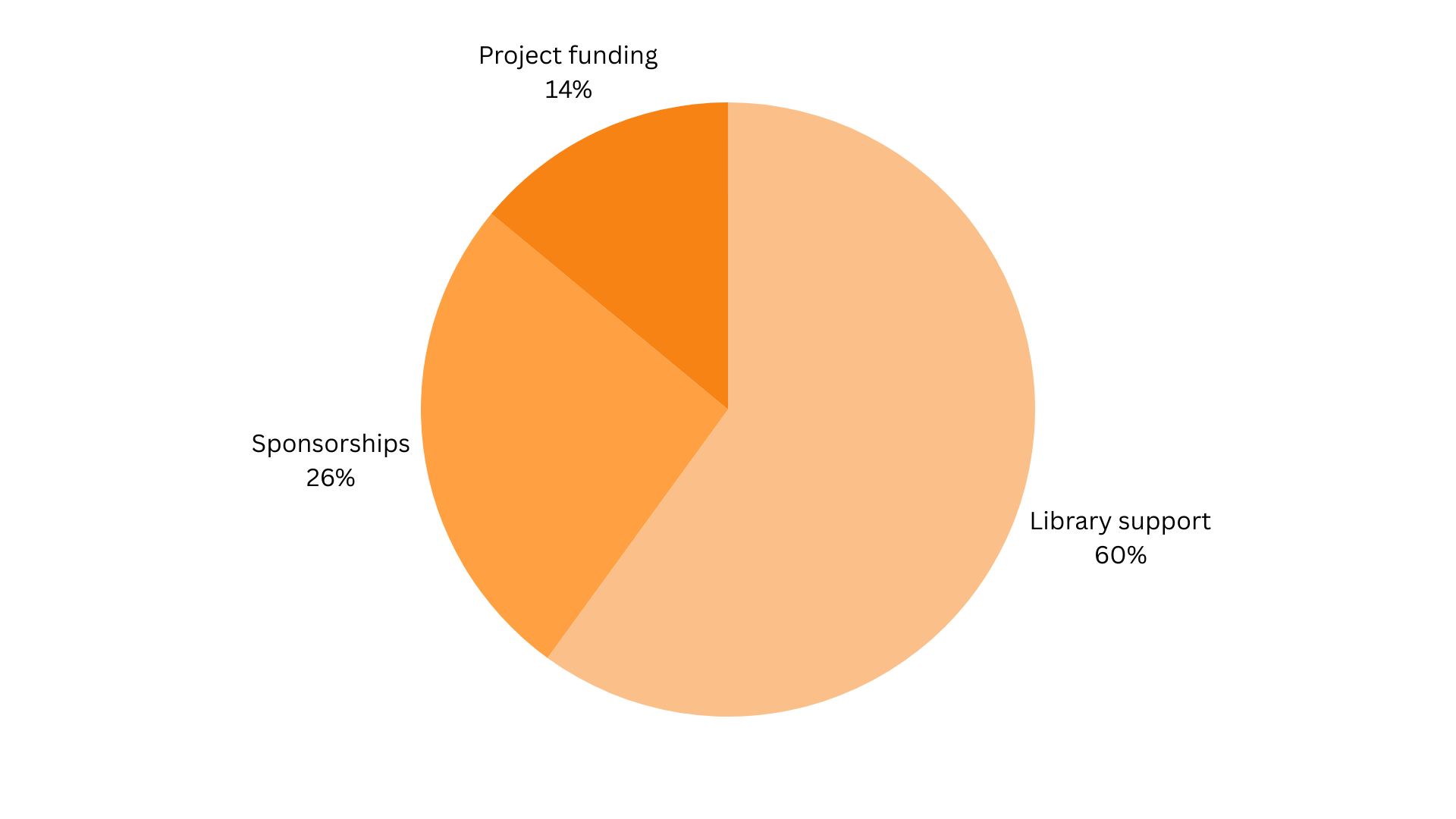
Figure 15: A pie chart showing the income for DOAB in 2024
